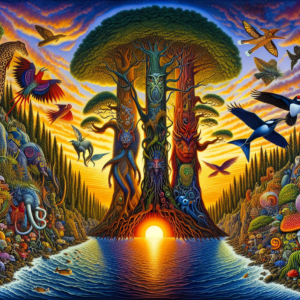Faith Meets Fact: Navigating the Intersection of Scripture and Scientific Discovery
In an age where scientific advancements occur at lightning speed, and discoveries are made daily that challenge our understanding of the universe, the relationship between faith and science remains a topic of vibrant discussion and exploration. For many, this intersection raises questions about the validity of sacred texts and the authenticity of scientific inquiry. However, rather than seeing these realms as adversaries, we can appreciate them as two sides of the same coin, each enlightening our understanding of existence and the world around us.
The Nature of Faith and Science
Faith and science serve different but complementary purposes. Faith often deals with questions of meaning, morality, and the human experience—the "why" behind our existence. On the other hand, science seeks to understand the mechanisms of the universe—the "how." Each discipline approaches understanding in unique ways, yet both strive for truth.
Faith, as expressed in religious scriptures, offers a moral compass and a sense of belonging. For many, it provides answers to life’s existential questions and nurtures hope. In contrast, scientific inquiry equips us with tools to explore the physical world, recognizing patterns, establishing theories, and asking questions based on observation and repeatability.
Bridging the Gap: Historical Perspectives
Throughout history, many prominent scientists have also been people of deep faith. Figures such as Isaac Newton, Albert Einstein, and Francis Collins have beautifully articulated their belief that faith and science coexist harmoniously. Newton, for example, saw the laws of physics as a glimpse into the divine order of creation, while Collins, a Christian and former head of the Human Genome Project, has written extensively about how his belief in God complements his scientific discoveries.
This historical intersection showcases that the pursuit of knowledge does not diminish one’s faith but often enhances it. Many scientists view their work as a form of worship—an exploration of the intricacies of creation that deepen their awe and reverence for the Creator.
Embracing Curiosity: A Faithful Inquiry
In engaging with the latest scientific discoveries, individuals can approach their faith with a spirit of curiosity rather than fear. Science often reveals the wonders of the universe, from the vastness of a starry sky to the complexities of DNA. For the faithful, each new understanding can be a moment to celebrate rather than to question the tenets of their beliefs.
For instance, the Big Bang theory, which posits that the universe began from a singular point, does not necessarily contradict the idea of creation as described in religious texts. Some theologians interpret the creation narrative in scriptures not as a chronological account, but as a theological framework that conveys the intentionality and wonder behind existence. In this light, science and scripture can operate in harmony, inspiring a sense of shared exploration.
Fostering Constructive Dialogue
As we navigate the intersection of faith and fact, engaging in constructive dialogue becomes paramount. Open conversations that foster understanding between religious communities and the scientific community can help diminish the perceived divide. Workshops, seminars, and community discussions can be fertile grounds for promoting a culture of respect and inquiry.
Christians, for instance, can explore how scientific discoveries provide deeper insights into biblical texts rather than seeing them as conflicting narratives. When both scientists and theologians come together in conversation, they can construct a more nuanced worldview that honors both faith and empirical evidence.
Encouragement for the Journey Ahead
For those grappling with the tension between faith and science, it’s essential to remember that doubt and inquiry are integral parts of the human experience. Questions about existence, purpose, and the universe’s intricacies do not indicate a weak faith; rather, they signify a sincere desire to understand our place in the cosmos.
Moreover, countless resources and communities exist to support this journey. Books, lectures, and various online platforms provide avenues for learning and discussion, making the pursuit of knowledge a collective and enriching experience.
Conclusion
In the end, the intersection of scripture and scientific discovery is not a battleground but a beautifully complex landscape marked by curiosity, wonder, and interconnectedness. Embracing both faith and scientific understanding can lead to a holistic worldview that nurtures personal growth, enriches spiritual understanding, and deepens our collective inquiry into the mysteries of life. As we continue to explore this intersection, let us do so with open hearts and minds, fostering a spirit of respect and appreciation for both realms as we navigate the extraordinary journey of existence.
Explore and dig up answers yourself with our BGodInspired Bible Tools! Be careful – each interaction is like a new treasure hunt… you can get lost for hours 🙂


